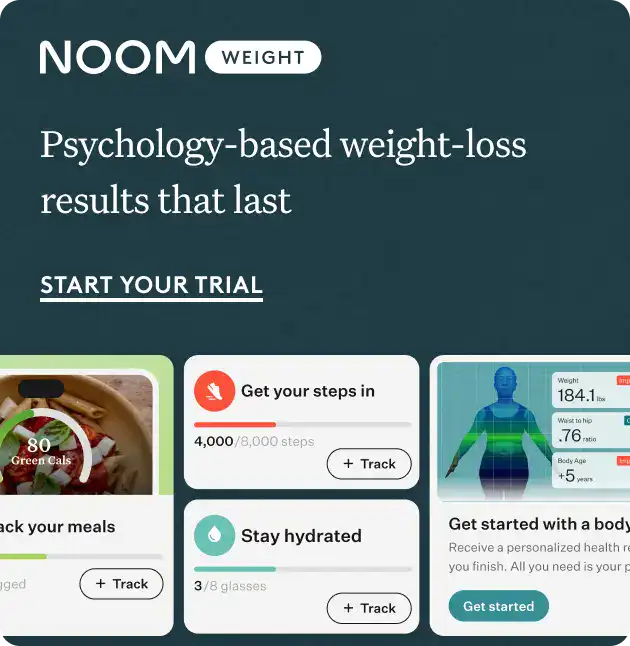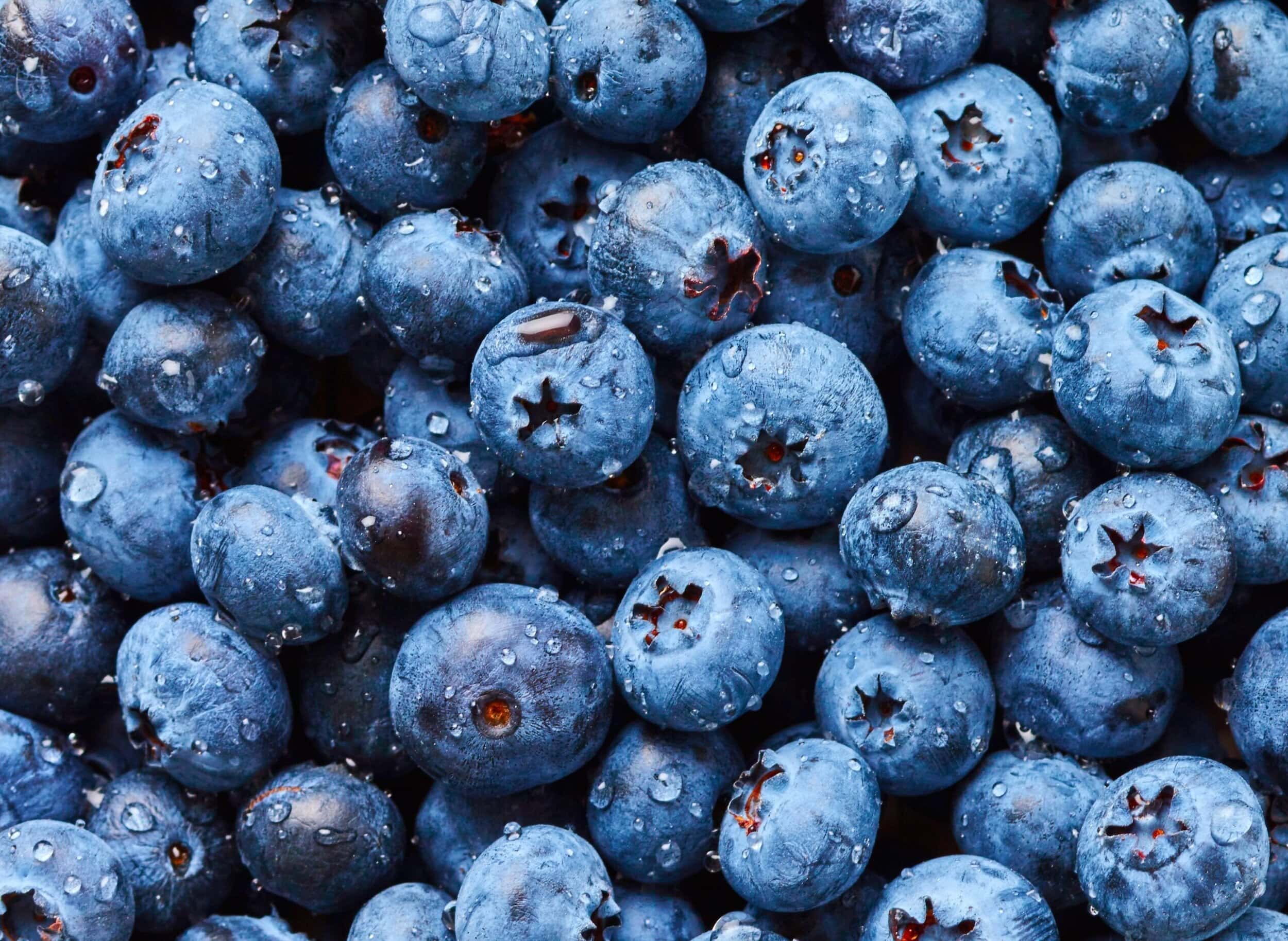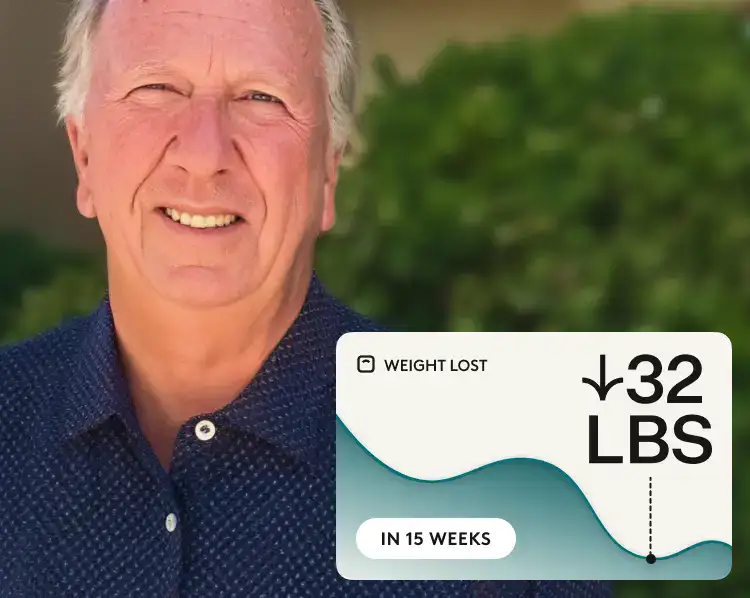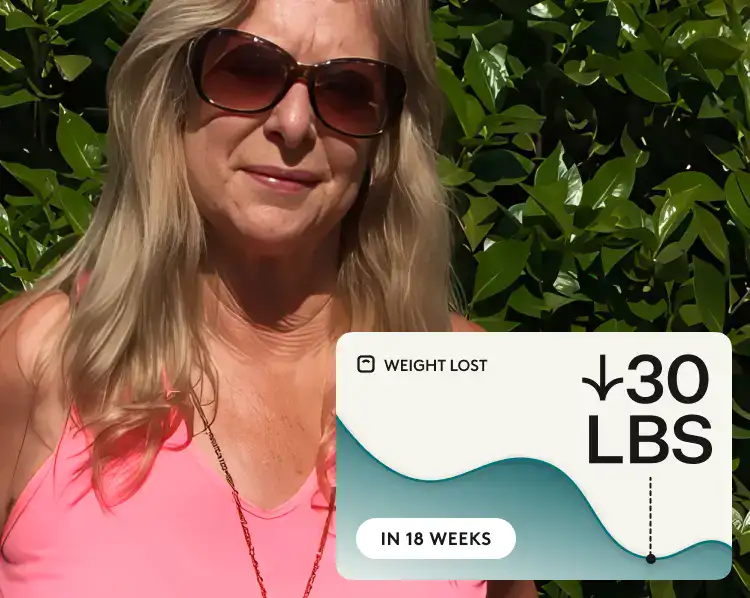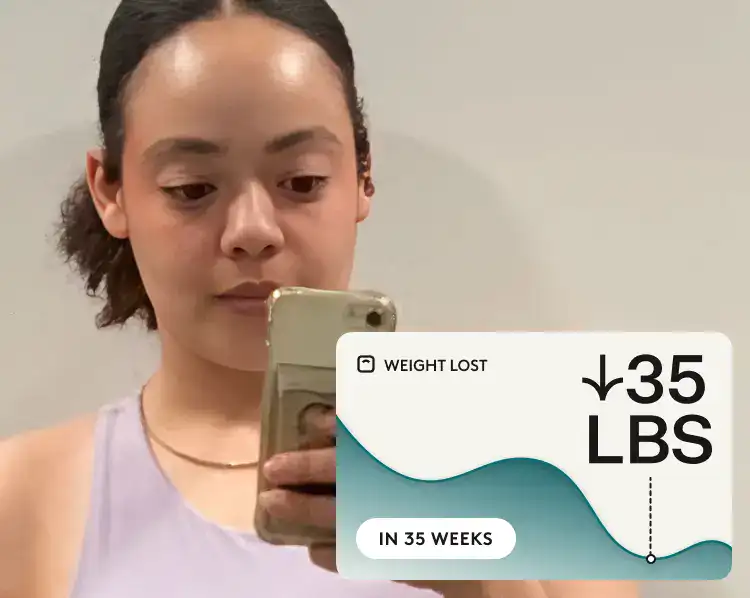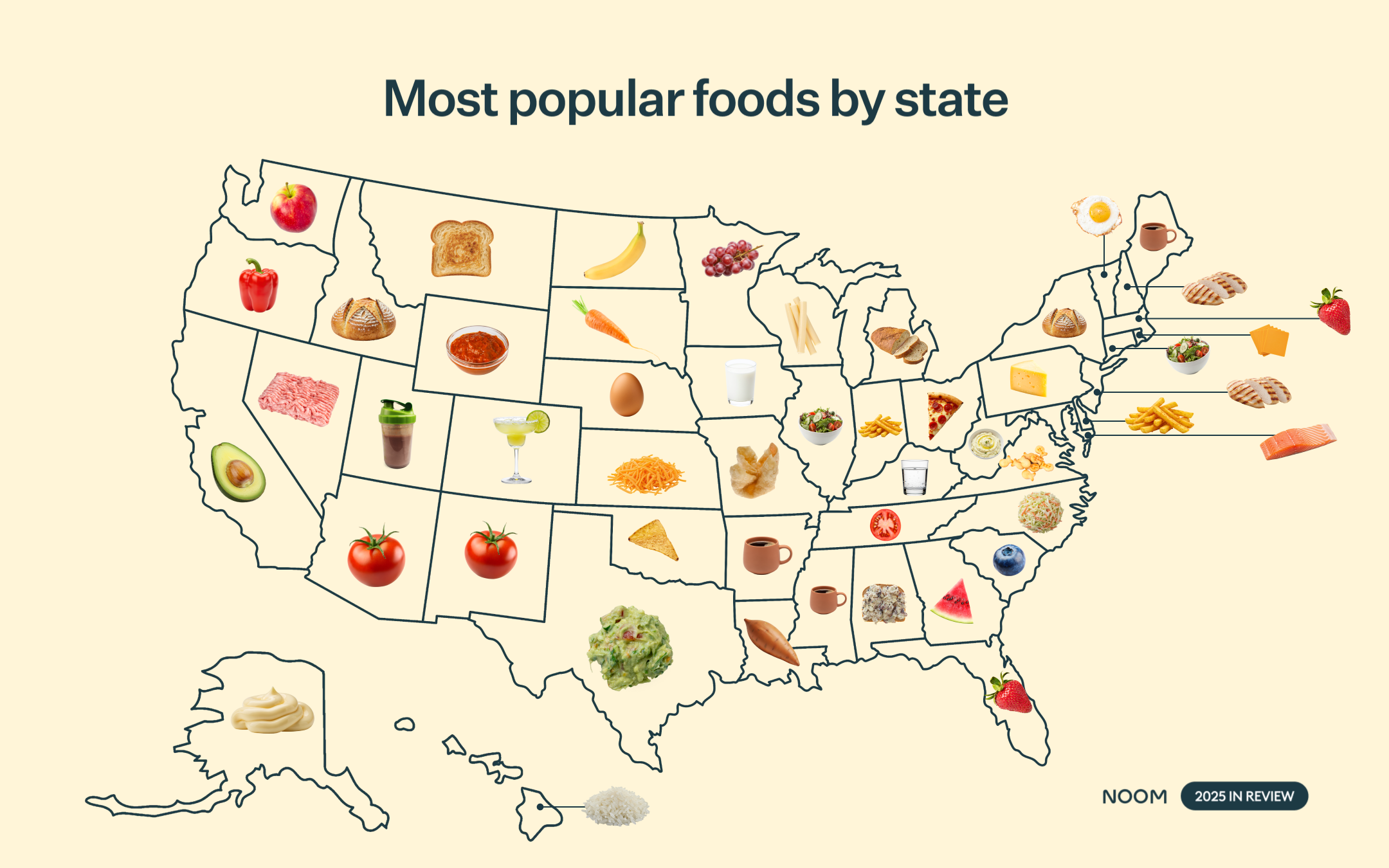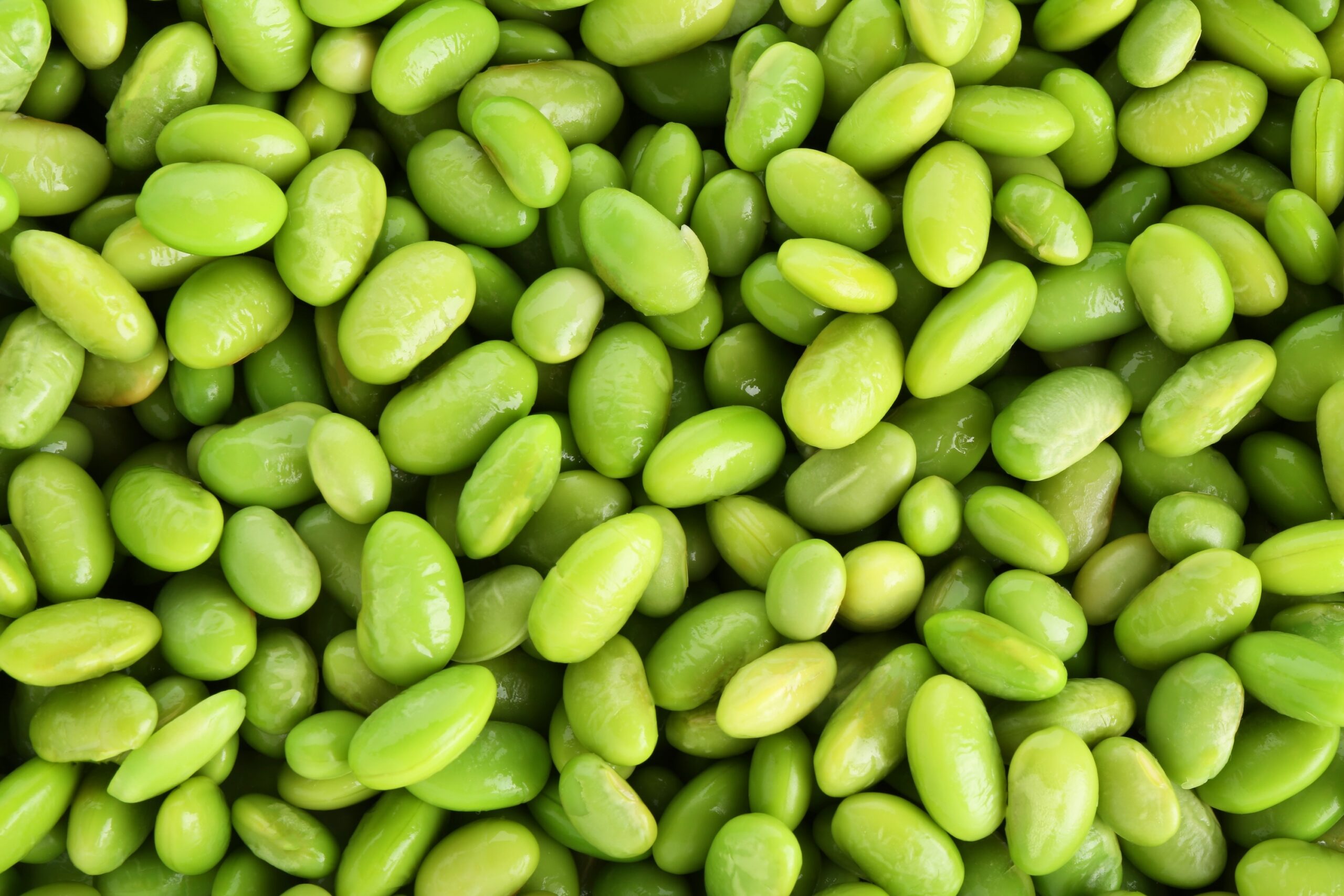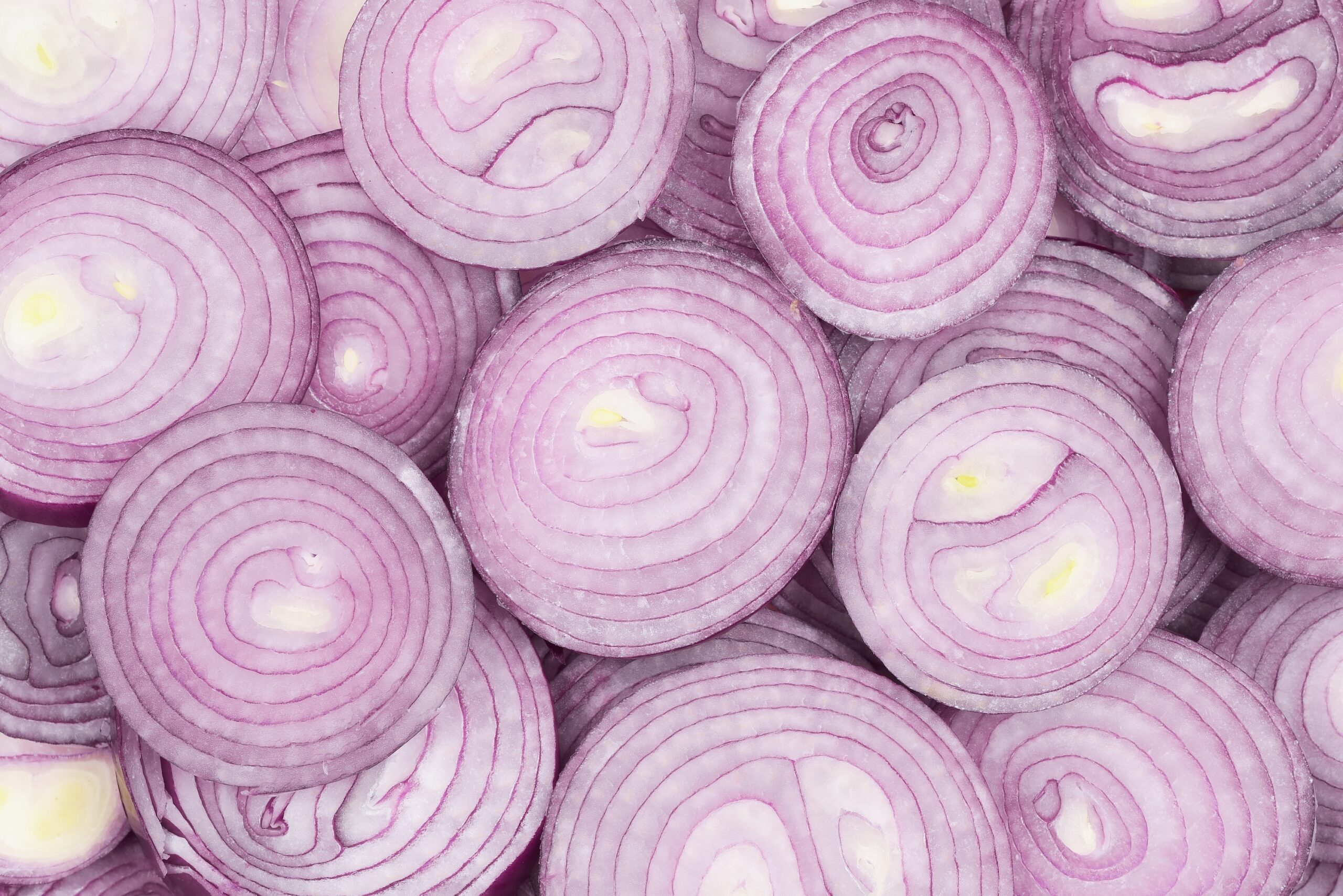Blueberries have a well-deserved spot on the “nutritious and delicious” list. They’re naturally sweet, which can help curb dessert cravings, and they pack fiber, vitamins, and antioxidants into every bite. At just 57 calories per 3/4 cup, they’re low in calories but high in nutrients that help you feel fuller and support a healthy metabolism.
That said, no single food can lead to weight loss. Blueberries can be a great addition to your plan, but they work best when they’re part of an overall eating pattern that includes a variety of whole foods, balanced meals, and mindful portions.
✅ Quick answer
Blueberries are low in calories, full of fiber, and rich in antioxidants—making them a tasty, nutrient-dense choice that can support your weight-loss goals.
✅ Why blueberries can support your goals:
- Low calorie density means more volume – You can enjoy a satisfying portion without eating too many calories, helping you feel full while staying within your calorie goals.
- Fiber helps control hunger – With over 2 grams of fiber per 3/4 cup, blueberries help slow digestion and keep blood sugar stable, reducing in between-meal cravings.
- Antioxidants support metabolism – The anthocyanins that give blueberries their color may help improve how your body processes glucose and fat.
⚠️ Things to be mindful of:
- Natural sugars still count – While the 10 grams of natural sugar per 3/4 cup is better than added sugar, it still contributes to your daily carb intake.
- Easy to overeat – These little berries are so delicious and portable that it’s simple to mindlessly munch through multiple servings.
- Not a complete protein source – You’ll want to pair them with protein-rich foods to create more balanced, satisfying meals and snacks.
🥗 Nutrients in blueberries (per 3/4 cup/100g)
| Nutrient | Amount | % RDA* |
|---|---|---|
| Calories | 57 calories | 3% |
| Protein | 0.7 g | 1.5% |
| Total carbs | 14.5 g | 5% |
| Fiber | 2.4 g | 9% |
| Sugars | 10.0 g | — |
| Total fat | 0.3 g | <1% |
| – Saturated fat | 0.03 g | <1% |
| – Monounsaturated fat | 0.05 g | — |
| – Polyunsaturated fat | 0.15 g | — |
| Omega-3 | 59 mg | — |
| Omega-6 | 87 mg | — |
A 3/4 cup serving of fresh blueberries gives you nearly 10% of your daily fiber needs for less than 60 calories. That’s what we call nutrient density! The majority of calories come from natural sugar, with minimal fat and protein. This makes blueberries perfect for volume eating, where you can enjoy a satisfying portion without significantly impacting your calorie budget.
*Recommended dietary allowance (RDA) is defined as the average daily amount of nutrients needed to meet the requirements of nearly all healthy people in a specific group.
💊 Vitamins & minerals in blueberries (per 3/4 cup/100g)
| Vitamin/Mineral | Amount | % RDA* |
|---|---|---|
| Vitamin K | 19.3 μg | 16% |
| Manganese | 0.3 mg | 15% |
| Vitamin C | 9.7 mg | 11% |
| Vitamin E | 0.6 mg | 4% |
| Vitamin B6 | 0.1 mg | 3% |
| Potassium | 77.0 mg | 2% |
| Magnesium | 6.0 mg | 1% |
| Zinc | 0.2 mg | 1.5% |
| Vitamin A | 3.0 μg | <1% |
| Selenium | 0.1 μg | <1% |
Blueberries deliver impressive amounts of three standout nutrients: vitamin K for bone health and blood clotting, manganese for metabolism and antioxidant enzyme function, and vitamin C for immune support and collagen production. While other vitamins and minerals appear in smaller amounts, they all contribute to blueberries’ reputation as a nutrient-dense food.
🔍 Nutrient breakdown
Glycemic index (GI) of blueberries
✔️ Glycemic index: 53 (Low)
💡Tip: Low-GI foods like blueberries release sugar slowly into your bloodstream, helping prevent energy crashes that can trigger cravings.
Are blueberries high in protein?
❌No: Blueberries contain just 0.7 g of protein per 3/4 cup serving.
🔹 Better protein alternatives: Greek yogurt | Cottage cheese | Nuts
Are blueberries high in fiber?
✔️Yes: Blueberries provide 2.4 g of fiber per 3/4 cup, which represents about 9% of your daily needs.
💡Tip: The combination of fiber and water in blueberries increases satiety, helping you feel satisfied on fewer calories.
Are blueberries low in carbs?
❌No: Blueberries have 14.5 g of carbs per 3/4 cup.
💡Tip: Focus on net carbs (total carbs minus fiber), which for blueberries is about 12.1 g—reasonable for most balanced eating plans.
Is blueberries gluten-free?
✔️Yes: Blueberries are naturally 100% gluten-free, making them safe for those with celiac disease or gluten sensitivity.
Is blueberries good for fat loss?
✔️Yes: Their low-calorie, high-fiber profile makes them helpful for fat loss by allowing you to eat satisfying portions while maintaining a calorie deficit.
🍽️ Diet compatibility: Which diets include blueberries?
| Diet | ✅Yes /❌No | Why |
|---|---|---|
| Keto | ❌ | With 14.5 g carbs per 3/4 cup, blueberries exceed most keto daily carb limits, though very small amounts might fit. |
| Paleo | ✅ | As a natural, unprocessed fruit available to hunter-gatherers, blueberries align perfectly with paleo principles. |
| Mediterranean | ✅ | Fresh fruits and antioxidant-rich foods like blueberries are cornerstones of the Mediterranean eating pattern. |
| Vegan | ✅ | Being plant-based, blueberries fit seamlessly into vegan and vegetarian lifestyles. |
| Gluten-free | ✅ | Naturally gluten-free, blueberries provide sweetness and nutrients without gluten exposure risk. |
Blueberries fit into most healthy eating approaches, particularly those emphasizing whole, nutrient-dense foods like paleo and Mediterranean diets. The main exception is keto, where their natural carb content makes them challenging to include in typical portions. For most other eating styles focused on health and weight management, blueberries earn an enthusiastic yes.
🌟 Are blueberries healthy? What are the health benefits
Metabolic health: Are blueberries good for your metabolism?
- ✔️Boosts metabolism? Yes – Anthocyanins in blueberries may help enhance your body’s ability to process glucose and fats more efficiently.
- ✔️Improves insulin sensitivity? Yes – Research suggests regular blueberry consumption can improve insulin sensitivity, helping your body manage blood sugar more effectively.
- ✔️Effect on fat storage? Helps prevent – The polyphenols in blueberries may help reduce fat cell development and growth.
Cholesterol impact: Do blueberries affect cholesterol levels?
- ✔️Does it lower LDL (bad) cholesterol? Yes – The antioxidants and fiber in blueberries help lower LDL cholesterol and prevent its harmful oxidation.
- ❔Does it raise HDL (good) cholesterol? Possibly – Some studies suggest positive effects on HDL, though evidence is less definitive than for LDL reduction.
- Overall impact on heart health? The combination of LDL reduction, blood pressure benefits, and improved blood vessel function makes blueberries clearly heart-healthy.
💡 Tip: Pair blueberries with oats for a double dose of cholesterol-lowering soluble fiber.
Can I eat blueberries for a calorie deficit?
✔️Yes, with confidence: At just 57 calories per 3/4 cup, blueberries provide high volume and nutrients while keeping calories low.
💡 Tip: Replace high-calorie desserts with fresh blueberries topped with Greek yogurt for a satisfying, lower-calorie alternative.
Are blueberries rich in antioxidants?
✔️Yes: Blueberries rank among the most antioxidant-rich foods available, loaded with anthocyanins that combat cellular damage.
Do blueberries support gut health?
✔️Yes: The fiber in blueberries acts as a prebiotic, feeding beneficial gut bacteria that support immunity and digestion.
Do blueberries support digestion?
Positive: The combination of fiber and water promotes regular bowel movements and prevents constipation.
Do blueberries help you feel satiated and less hungry?
Moderate: The fiber and water content add bulk to help you feel full, though the effect is moderate compared to higher-protein foods.
Satiety Level: Medium
💡 Tip: Combine blueberries with protein sources like cottage cheese or nuts for enhanced, longer-lasting fullness.
Do blueberries help with nighttime cravings?
✔️Yes: A small bowl can satisfy sweet cravings for far fewer calories than typical desserts, without causing blood sugar spikes.
💡 Tip: Keep pre-portioned servings ready for those late-evening sweet tooth moments.
Do blueberries help reduce inflammation?
✔️Yes: The anthocyanin antioxidants in blueberries have potent anti-inflammatory properties that may help reduce chronic inflammation.
Is blueberries beneficial for brain health?
✔️Yes: Flavonoids in blueberries may cross the blood-brain barrier to improve cognitive function and protect against age-related memory decline.
Can blueberries improve skin and hair health?
✔️Yes: Vitamin C supports collagen production for skin structure, while antioxidants protect against environmental damage.
Can blueberries help balance hormones?
✔️Yes: A healthy gut microbiome supported by blueberry fiber helps metabolize hormones like estrogen, while anti-inflammatory properties support overall endocrine health.
💡 Tip: Hormone balance depends on overall diet quality and lifestyle factors beyond any single food.
🍽️ Best ways to eat blueberries for weight loss
- Fresh and raw: Preserve all delicate vitamins and antioxidants by enjoying them straight up or adding to yogurt, oatmeal, or salads.
- Blended into smoothies: Combine with protein powder, Greek yogurt, and leafy greens for a balanced, filling breakfast or snack.
- Frozen as a snack: Frozen blueberries offer a satisfying, almost ice-cream-like texture that can curb dessert cravings.
🚀 Weight-loss benefits
- High volume, low calories help you eat satisfying portions while maintaining a calorie deficit, a key principle for successful weight loss.
- Fiber content slows digestion and sugar absorption, keeping you fuller longer and preventing energy crashes that lead to cravings.
- Metabolic support from anthocyanins may improve insulin sensitivity and fat metabolism, helping your body burn calories more efficiently.
⚠️ Potential downsides
- Easy overconsumption can happen because they’re so tasty and convenient—stick to measured portions to avoid exceeding calorie goals.
- Limited staying power when eaten alone due to minimal protein and fat content—pair with other macronutrients for better satiety.
🍏 Best alternatives & comparisons (Per 3/4 cup/100g)
| Food | Calories | Carbs | Fiber | Protein | Fat |
|---|---|---|---|---|---|
| Blueberries | 57 | 14.5 g | 2.4 g | 0.7 g | 0.3 g |
| Strawberries | 32 | 7.7 g | 2.0 g | 0.7 g | 0.3 g |
| Raspberries | 52 | 11.9 g | 6.5 g | 1.2 g | 0.7 g |
| Blackberries | 43 | 10.2 g | 5.3 g | 1.4 g | 0.5 g |
All berries are great to eat when you’re trying to reduce calories, with raspberries and blackberries offering even more fiber to keep you full. Strawberries provide fewer calories and carbs. Any of these berries work well interchangeably to add variety to your eating plan while supporting your weight-loss goals.
Frequently asked questions about blueberries and weight loss
How many blueberries should I eat per day for weight loss?
A 3/4 cup (100g) serving provides excellent nutrition for just 57 calories, but it would be tough to eat too many blueberries.
Are frozen blueberries as good as fresh for weight loss?
Yes! Frozen blueberries retain virtually all their nutrients and can actually be more convenient and cost-effective while offering the same weight-loss benefits.
Can I eat blueberries at night without affecting weight loss?
Absolutely. Their low glycemic index means they won’t spike blood sugar, and their natural sweetness can satisfy evening cravings better than processed desserts.
Are blueberries better than other fruits for weight loss?
Blueberries are among the best choices due to their low calories, high fiber, and exceptional antioxidant content, but variety in fruit intake provides broader nutritional benefits.
Can people with diabetes eat blueberries?
Yes, their low glycemic index and fiber content help manage blood sugar, making them a smart choice for diabetics focusing on weight management. Always follow your doctor’s advice first.
🧠 The bottom line: Are blueberries good for weight loss?
Blueberries are a unique combination of low calories, satisfying fiber, and metabolism-supporting antioxidants, making them an ideal food for anyone trying to lose weight. Remember, sustainable weight loss comes from consistent, balanced choices rather than relying on any single “superfood.” Blueberries work best when they’re part of an overall eating pattern that includes adequate protein, healthy fats, and a variety of colorful fruits and vegetables.
📖 Scientific evidence
- Blueberries may help keep you healthy and manage weight (Advances in Nutrition, 2020): This review found that eating blueberries often is linked to a lower risk of heart disease, type 2 diabetes, and weight gain, and may also help with blood sugar, inflammation, and gut health.
- Blueberries may help heart and blood health (The American Journal of Clinical Nutrition, 2019): In a study, people who ate blueberries every day had better blood flow and healthier cholesterol levels, though their blood sugar stayed the same.
- Blueberries can help your heart work better (Food & Function, 2017): In this study, men who ate blueberries regularly had healthier blood vessels and lower top blood pressure numbers, which may help protect the heart.
- Anthocyanin-rich foods help your heart and calm inflammation (Food & Function, 2024): Regularly eating foods rich in anthocyanins—like berries—can improve blood vessel function, boost your antioxidant defenses, and support healthier cholesterol levels while lowering inflammation.
- Blueberries support heart, brain, gut, and exercise recovery (Frontiers in Nutrition, 2024): A review of several studies shows that blueberries, and the anthocyanins that give them their color, can help support heart health, steady blood sugar, boost brain function, promote gut health, and aid in exercise recovery.
Editorial standards
At Noom, we’re committed to providing health information that’s grounded in reliable science and expert review. Our content is created with the support of qualified professionals and based on well-established research from trusted medical and scientific organizations. Learn more about the experts behind our content on our Health Expert Team page.
